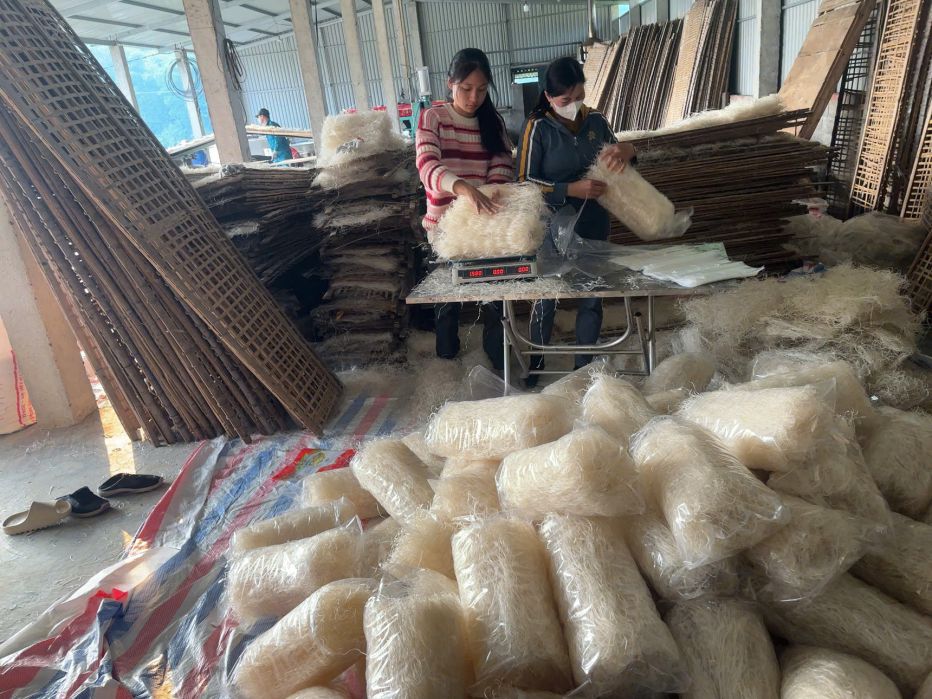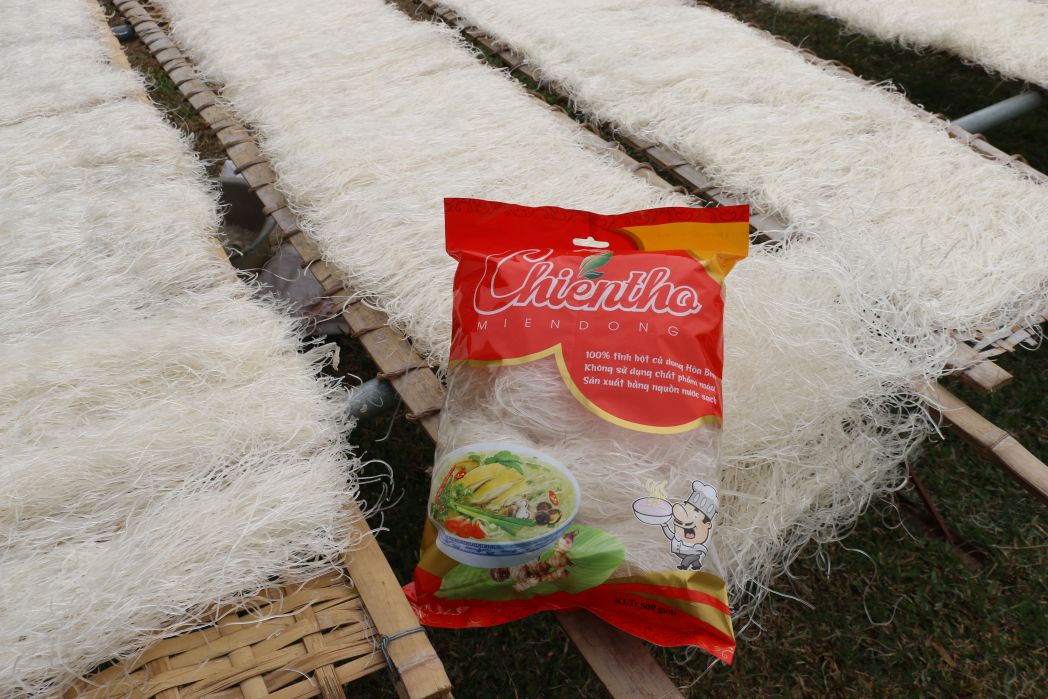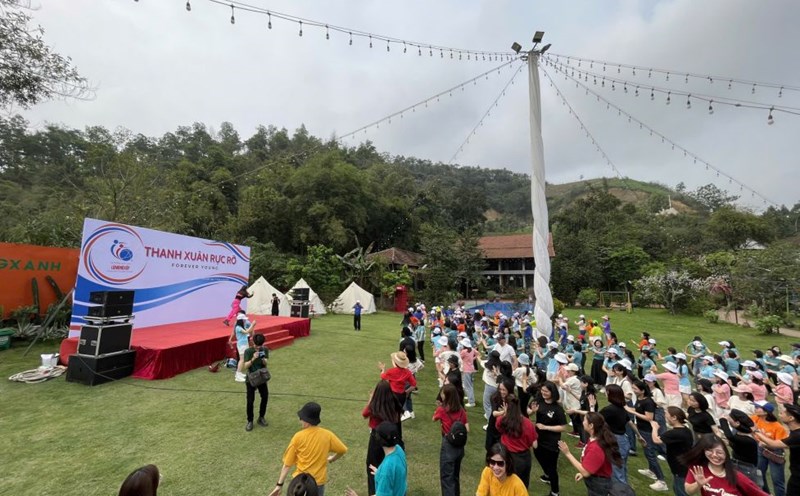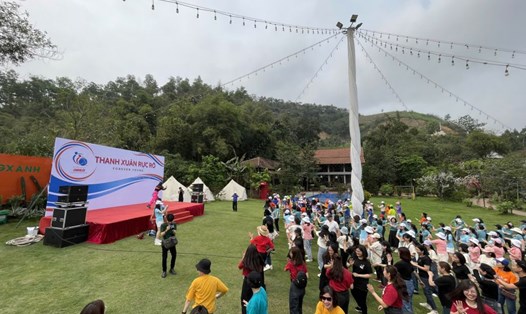Specialties of the village growing cassia
On the days leading up to Lunar New Year 2025, in the chilly weather of the Northwest mountains, we had the opportunity to visit Bu Cham village. Villagers were busy preparing to harvest cassava, make starch and cassava vermicelli to serve the market demand during Lunar New Year.
Talking to Lao Dong Newspaper reporter, Mr. Nguyen Phuc Tuan - Chairman of Thinh Minh Commune People's Committee, Hoa Binh City said: "Bu Cham and Thinh Minh areas have had a tradition of growing cassava for decades. Currently, in Thinh Minh Commune, there are nearly 200 hectares of cassava. The yield and output of cassava cultivation every year have achieved good results".
According to Mr. Tuan, Bu Cham villagers usually sell fresh tubers or make starch and then sell them to traders to make vermicelli. However, since 2015, after learning about the vermicelli processing facilities that Bu Cham villagers have supplied raw materials to, some households have started opening vermicelli processing workshops right in the middle of their hometown's raw material area.
Going around the village, we visited the vermicelli production facility of Mr. Do Van Chien (51 years old), owner of Chien Tho vermicelli production facility.
Mr. Chien said: "Dong vermicelli is available all year round, but from September and October onwards it is considered the main crop to prepare for Tet."
According to Mr. Chien, the closer to Tet in Bu Cham village, the more bustling the atmosphere of harvesting cassava, grinding starch and making cassava vermicelli becomes. On average, 2 tons of starch will produce 1 ton of cassava vermicelli. To serve the Tet market, traders from the provinces will bring trucks to pick up the goods. Every day, the factory will export about 1 ton of finished vermicelli to the provinces.

His cassava vermicelli factory officially came into operation in 2018 with nearly 40 hectares of cassava growing from direct resources to serve production. Since 2019, Chien Tho cassava vermicelli has been recognized by the People's Committee of Hoa Binh province as a 3-star OCOP product and has become a local specialty agricultural product. On average, each year, the facility processes about 2,000 tons of fresh tubers, producing about 110 - 120 tons of finished products.
However, this year's crop was difficult for farmers due to the impact of Typhoon Yagi in September 2024, which knocked down all the arrowroot plants. The arrowroot sprouted for the second time, resulting in a late harvest, and the flour yield for the main crop was not as good as in previous years.
“This year, the consumption of goods is slower than every year. Input prices from last year until now have been high, so the finished products we make are also high, leading to a decrease in consumer purchases. Every year from 2022 onwards, the crop produced more than a hundred tons of finished products each year. But now the output has decreased due to high input prices,” said Mr. Chien.
Innovation through technology
To make cellophane noodles, the vermicelli maker must be very careful and meticulous at each stage. The harvested cassava tubers are washed, all the dirt is removed, and then transferred to the mill to make flour. The cassava flour is soaked in water and filtered to select the starch. When put into the coating machine, the cassava flour must be pure, free of fibers and sticky enough.
Next, the dough is rolled into cakes, steamed and dried in the sun on bamboo mats. Once almost dry, the cakes are passed through a machine to roll into small, long vermicelli strands and then dried in the sun to form finished vermicelli. The drying process depends a lot on the weather. If favorable, just one sun is enough to dry.
The finished vermicelli is clear white because it uses 100% arrowroot powder - a readily available ingredient in Bu Cham village. The fibers are naturally tough and crispy, and do not become mushy or sticky when overcooked. No preservatives or additives are used.
“In the past, vermicelli was handmade, coated by hand, the technology to make cassava flour was not technical enough, it had to be left overnight to settle to get the starch. Later, with scientific innovation, we made it by machine, the entire flour production process is done by modern machinery, including the coating machine and the vermicelli cutting machine, the process of grinding cassava into starch only takes 10 minutes.
Currently, my family produces 700-800 kg of finished vermicelli every day. The retail price of each 500-gram package of finished vermicelli is 40,000 VND. The consumption market is in all provinces and cities across the country such as Hanoi, Thanh Hoa, Saigon, Thai Nguyen, Vinh Phuc, Phu Tho..." - Mr. Chien confided.
Thanks to local raw materials and modern machinery, the cellophane noodles from Bu Cham village under the Chien Tho brand are carefully packaged, beautifully designed, with stamps, labels, and full information about production date, expiration date... creating customer trust.
Ms. Nguyen Thi Van Anh (33 years old, living in Hoa Binh city) said: “The dong vermicelli produced in Bu Cham village is delicious, crispy, chewy, unforgettable, even if cooked over a little too much heat, the vermicelli still does not break. Every year, I often order Bu Cham village vermicelli several times to feed my family and give to relatives, as a way for me to support the agricultural products of my hometown”.

Economic development from vermicelli making
From the lush green hillsides of cassava, under the diligent, hard-working and skillful hands of farmers, the fragrant, soft vermicelli has brought in billions of dong in revenue each year for farmers.
According to Mr. Chien, the factory's revenue last season reached 4 billion VND, with a profit of more than 200 million VND. In addition, his vermicelli production facility has created jobs for dozens of local workers. Income from vermicelli production and trading is higher than that from regular farming. Machine workers alone earn 11 - 12 million VND/month, while workers doing simple tasks such as drying earn 7 - 8 million VND/month...
The production of vermicelli not only maintains the cassava growing profession of Bu Cham village but also brings higher economic efficiency compared to simple farming, while also providing a relatively good income, creating stable jobs for local workers.
Mr. Nguyen Phuc Tuan - Chairman of the People's Committee of Thinh Minh Commune, Hoa Binh City said: "In recent years, the effectiveness of growing cassava and producing vermicelli in the area has been very positive, local vermicelli products are favored by the market, vermicelli makers have stable income, gradually improving their lives. In the coming time, the locality will focus on expanding this effective business model. From there, gradually increase income, solve jobs for workers".











